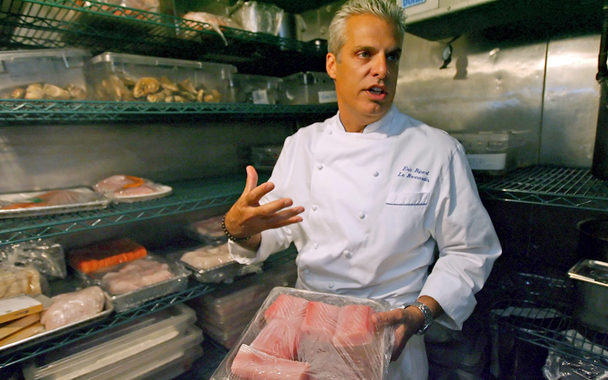It’s romantic to believe that, behind the scenes at a great restaurant, the chef is in the kitchen every minute, cooking every ingredient that ends up on every plate, every day. But the truth is, the chef who oversees and controls a big team in his kitchen—rather than preparing and plating each dish—is not a new phenomenon. By the late 1800s, famous chefs like Auguste Escoffier had started to manage multiple kitchens in grand European palace hotels. And when Paul Bocuse, Michel Guérard, even Fernand Point started to go visit their clients in the dining room during service, they obviously had found a way to have the kitchen running properly without them.
The best analogy I have is that a chef’s role is almost like a conductor’s of an orchestra. He does not play one instrument. Rather, he makes sure the whole ensemble works correctly together, each instrument doing its part, to create the “music” that wafts into the front of the house.
For many years at Le Bernardin, my restaurant in New York City, my role was chef de cuisine, and I was directly responsible for expediting during service. To be honest, I used to micro-manage all the time. I wasn’t able to see the big picture. But back then, I was working under Gilbert Le Coze, who originally opened the restaurant in 1986 with his sister Maguy. He was the one responsible for running the business—every aspect, right down to replacing the last broken salad plate. I didn’t have to think about anything other than getting the right food to the right person, and making sure it was perfectly cooked.
After Gilbert passed away suddenly in 1994, I took over the kitchen and became a partner in the business. My role naturally evolved, and it was imperative that I broaden my scope. Earlier in my career I didn’t have the right attitude about mentoring my cooks. I felt if I wasn’t being tough on them, they wouldn’t learn. The consequence was that I didn’t have a happy and strong team, and as a result, they made mistakes. It was an old-fashioned way of running a kitchen. Since then, I’ve tried to become a more modern chef.
Today, there are more than 40 chefs in the kitchen at Le Bernardin—including the executive chef (that’s me), a chef de cuisine, an executive sous chef, and four sous chefs. Whether I’m in the kitchen or not, the goal and responsibilities of the team remain exactly the same. It’s crucial that the sous chefs in particular understand my style and philosophy, so they can pass that knowledge down to the rest of the kitchen staff. The sous chefs are, like me, part disciplined manager and part creative artist. The job is both physical and mental. They keep the kitchen moving, motivated, and clean. They must respect costs to meet budgets (an art in itself). When we create new dishes, our sous chefs are involved in the process. During service, they pace the team, and throughout the day they taste the food constantly to ensure its quality.
Becoming a sous chef is no small feat—the entire process takes a minimum of four years. You begin as a garde-manger (working at the kitchen’s cold station) before moving to the vegetable station, then the poaching station, followed by the sauté station, then the sauce station, and finally, you’re a junior sous chef. I consider the saucier to be a very special and important link in the chain. In the positions below that rank, the teaching tends to be technical, while the saucier needs to combine technique and instinct. You cannot measure sauce in ounces or inches—it’s all in the mind. Of course, I interact with every cook at every level, but I tend to have a stronger connection with the saucier because I like to be involved in that process.
Le Bernardin is expanding, and we now have restaurants in the Cayman Islands, Washington, D.C., and Philadelphia. The chefs who run those kitchens come from Le Bernardin. And I do travel to check in with them individually. But they make pretty good music without me.


